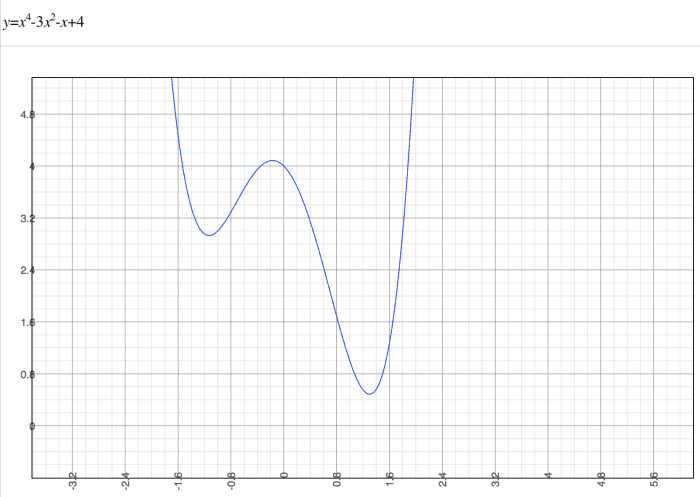What Is Not A Polynomial
Melanie has a BS in concrete science and is in grad school for analytics and modeling. She also runs a YouTube channel: The Curious Coder.

Polynomial Rules
What are the rules for polynomials? The curt answer is that polynomials cannot incorporate the following: sectionalisation by a variable, negative exponents, fractional exponents, or radicals.
What Is a Polynomial?
A polynomial is an expression containing ii or more algebraic terms. They are often the sum of several terms having different powers (exponents) of variables.
There are some pretty cool things well-nigh polynomials. For example, if you add or subtract polynomials, yous get another polynomial. If you multiply them, yous get another polynomial.
Polynomials often represent a function. And if you graph a polynomial of a single variable, yous'll get a nice, polish, curvy line with continuity (no holes).
What Does 'Polynomial' Mean?
The poly in polynomial comes from Greek and means multiple. Nomial, which is also Greek, refers to terms, so polynomial means multiple terms.

A polynomial tin contain variables, constants, coefficients, exponents, and operators.
Melanie Shebel
What Makes Upwards Polynomials?
A polynomial is an algebraic expression fabricated upwards of ii or more terms. Polynomials are equanimous of some or all of the post-obit:
- Variables: These are letters like 10, y, and b.
- Constants: These are numbers similar 3, v, and 11. They are sometimes fastened to variables merely are also found on their own.
- Exponents: Exponents are unremarkably attached to variables but can also be institute with a constant. Examples of exponents include the 2 in 5² or the 3 in x³.
- Addition, subtraction, multiplication, and partition: For example, you can have 2x (multiplication), 2x+five (multiplication and addition), and x-7 (subtraction.)
Rules: What ISN'T a Polynomial
At that place are a few rules equally to what polynomials cannot incorporate:
Polynomials cannot contain partitioning past a variable.
For example, 2y2+7x/4 is a polynomial because 4 is not a variable. However, 2y2+7x/(i+x) is not a polynomial as it contains partitioning by a variable.
Polynomials cannot contain negative exponents.
Yous cannot have 2y-2+7x-iv. Negative exponents are a class of division by a variable (to make the negative exponent positive, y'all have to divide.) For example, 10-3 is the same affair as ane/x3.
Polynomials cannot contain fractional exponents.
Terms containing fractional exponents (such equally 3x+2y1/ii-1) are non considered polynomials.
Polynomials cannot incorporate radicals.
For case, 2y2 +√3x + 4 is non a polynomial.

A graph of a polynomial of a unmarried variable shows nice curvature.
Melanie Shebel
Scroll to Continue
Read More From Owlcation
How to Notice the Degree of a Polynomial
To find the polynomial degree, write down the terms of the polynomial in descending order past the exponent. The term whose exponents add up to the highest number is the leading term. The sum of the exponents is the degree of the equation.
Example: Figure out the degree of 7x2y2+5y2x+4x2.
Start past adding the exponents in each term.
The exponents in the offset term, 7x2y2, are 2 (from 7x2) and ii (from y2) which add together up to 4.
The second term (5y2x) has ii exponents. They are 2 (from 5y2) and 1 (from x, this is because ten is the same every bit x1.) The exponents in this term add up to three.
The concluding term (4x2) merely has one exponent, two, so its caste is but ii.
Since the outset term has the highest degree (the fourth degree), information technology is the leading term. The degree of this polynomial is four.
Test Your Knowledge
For each question, cull the best respond. The answer primal is below.
- What is/are the constant(southward) in 3y² + 2x + five?
- 3
- 2
- v
- All of the in a higher place
- What is/are the term(s) in 3y² + 2x + five?
- 3y²
- 2x
- 5
- All of the above
- What is/are the coefficient(due south) in 3y² + 2x + five?
- iii
- two
- five
- Both 3 & ii
- Which of the following is a variable in 3y² + 2x + 5?
- ²
- x
- 5
Reply Cardinal
- 5
- All of the to a higher place
- Both 3 & 2
- x
Different Types of Polynomials
There are different ways polynomials can be categorized. They are often named for the degree of the polynomial and the number of terms it has. Hither are some examples:
- Monomials: These are polynomials containing only one term ("mono" ways ane.) 5x, four, y, and 5y4 are all examples of monomials.
- Binomials: These are polynomials that contain only ii terms ("bi" ways 2.) 5x+1 and y-seven are examples of binomials.
- Trinomials: These are polynomials that contain 3 terms ("tri" meaning three.) 2y+5x+1 and y-10+7 are examples of trinomials.
There are quadrinomials (four terms) and so on, but these are unremarkably just chosen polynomials regardless of the number of terms they incorporate. Polynomials tin can have an infinite number of terms, so if you're non certain if it's a trinomial or quadrinomial, you can call it a polynomial.
A polynomial tin can also be named for its degree. If a polynomial has a degree of two, information technology is often called a quadratic. If it has a caste of 3, it can be called a cubic. Polynomials with degrees college than three aren't usually named (or the names are seldom used.)
You can practice numerous operations on polynomials. Here, the FOIL method for multiplying polynomials is shown.

There are a number of operations that can be done on polynomials. Here the FOIL method for multiplying polynomials is shown.
Melanie Shebel
Operations on Polynomials
Now that yous understand what makes up a polynomial, information technology'due south a good idea to get used to working with them. If you're taking an algebra course, chances are you'll be doing operations on polynomials such as adding them, subtracting them, and fifty-fifty multiplying and dividing polynomials (if yous're not already doing so).
© 2012 Melanie Palen
Miltone on May 23, 2020:
Excellent caption. Thanks.
Naresh on May 12, 2020:
Why polynomials don't have negative exponents? I am not able to discover any reason for this.
Ojasva on May 11, 2020:
What is negative exponent or partial exponent variable chosen, if not monomial or polynomial
Vin Chauhun from Durban on May 07, 2012:
just looking at those equations caused my encephalon to breakout into a civil war. :)
Moon Daisy from London on April eighteen, 2012:
A great hub. I dearest maths, just I'yard a little rusty on the terminology. So cheers!
cardelean from Michigan on April 17, 2012:
Excellent guide. I have a feeling I'll be referring back to it every bit my kids get a little older! :)
Sondra from Neverland on April 15, 2012:
Melbel I volition non take your quiz because I already know I volition fail hehe Math never was my thing. Oddly enough my daughter (eleven) is a math genius and I am going to let her read this tomorrow. She volition love it :)
Teresa Coppens from Ontario, Canada on April fifteen, 2012:
Another cracking math hub Mel. Very useful for those struggling with these concepts and in that location are many out there including parents struggling to help their kids in grades 6 to eight with basic algebra.
Xavier Nathan from Isle of Man on April fifteen, 2012:
A very squeamish treatment of this topic and I think y'all should besides create a YouTube aqueduct and make short videos to go with each of your hubs and earlier long you volition have lots of mathematics students following y'all. Great work.
Jessee R from Gurgaon, Republic of india on Apr 15, 2012:
Nice basic outlay near polynomials... informative
Zulma Burgos-Dudgeon from Uk on Apr 15, 2012:
I have to confess, I got dislocated and frustrated after the outset paragraph. Math and I don't go on.
But from what I could comprehend this seems to be a good hub and I don't doubt you'll be helping loads of people who possibly didn't understand their teacher's explanation.
Voted up and useful.
Phil Plasma from Montreal, Quebec on April fourteen, 2012:
Excellent explanation of what a polynomial is.
What Is Not A Polynomial,
Source: https://owlcation.com/stem/What-Is-a-Polynomial
Posted by: robertsonwithatim55.blogspot.com


0 Response to "What Is Not A Polynomial"
Post a Comment